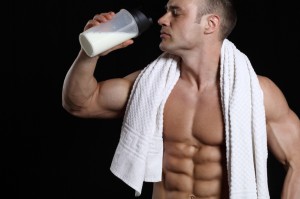 New Health Guide
New Health Guide
Protein shakes are quite common and popular with fitness enthusiasts. Thanks to their ever-increasing popularity, they are now easily available in bodybuilding stores as well as grocery stores and other health-food establishments. It is true that you need protein for better health because it repairs and builds cells. The only thing is to determine when to take the protein shake to get best results. Let's find out more about it.
 When should you drink protein shake? It is hard to find a clear answer. Drinking it both before and after workout will offer certain benefits. If you take it before the workout, it provides you with the energy you require throughout your workout session. If you drink protein shake after your workout, it helps accelerate recovery. What you want to achieve will help you determine whether you should drink your protein shake before or after workout.
When should you drink protein shake? It is hard to find a clear answer. Drinking it both before and after workout will offer certain benefits. If you take it before the workout, it provides you with the energy you require throughout your workout session. If you drink protein shake after your workout, it helps accelerate recovery. What you want to achieve will help you determine whether you should drink your protein shake before or after workout.
It is fine to drink your shake before you start your exercise. You should, however, ensure you don't have it right before your workout – doing this may cause stomach discomfort when you actually start your exercise session. It is a good idea to have your shake with your meal at least 2-4 hours before your workout session. Even better is to pair your shake with carbohydrates – you can opt for a piece of fruit, bagel, or cereal.
You can also opt for pre-workout protein shake for fat loss.This is usually the time when glycogen levels are already low, so drinking your shake will improve fat burning during your workout session – the fat oxidation is even better during a metabolic resistance training session.
Pre-workout shakes, especially the branched chain amino acids (BCAAs), will provide you with energy to perform your workout with intensity. It is so because your liver doesn't have to process these amino acids – they enter your bloodstream after being absorbed by your body.
After a strenuous workout, it is obvious to feel tired, because your body breaks down protein and uses any stored carbohydrates. It means you will experience muscle growth if you opt for a post-workout protein shake. The shake will also help replenish your glycogen levels, especially if you also take carbohydrates within half an hour of your workout. The best option is to mix low-fat milk and protein powder to prepare your shake – add your favorite fruit to it and drink within the first 30 minutes of completing your workout session. You can consider switching to almond, unsweetened soy, or coconut milk if you're lactose intolerant.
It is obvious to feel confused while deciding if you should drink protein shake before or after workout, but there are other things to consider when you're taking shakes for workout.
It is important to point out that you can find a variety of protein powder and protein products in the market today. You can find casein and egg, whey, as well as powder obtained from vegan sources such as hemp protein powder. Some experts are of the view that the source of protein will have an impact on the benefits you receive – although there is no real research to back this statement. It is still a good idea to try different types of protein powder products and see what suits you the most.
However, you don't have to worry about protein timing if you're not running hard or doing a workout of average intensity. You should, of course, eat balanced diet to fulfill your nutritional needs. The experts believe the total protein intake matters more in this case – it means what you take throughout the day will have an impact on muscle growth and weight loss. You should at least be consuming 20g of protein every three hours at least four times a day to trigger muscle growth. Consuming protein throughout the day will help lose weight because protein is quite satiating and keeps you from eating more. So, consider your exercise program and then decide how much protein to take and how.
You need to consider what type of exercises you're going to do. This will have an impact on what type of protein shake you need. You don't usually need to take any protein shakes if you're not involved into strength training or high intensity forms of exercises. In fact, you don't usually need any sports supplement if you're sticking to moderate sessions of exercise.
You need to bear in mind that adding protein shakes to your diet may mean adding extra calories to your diet. It is therefore a good idea to pay attention to the calorie count of every protein powder or product you buy. Check the label to know how many calories it contains. You may also considering using skimmed milk instead of using full fat varieties to keep your calorie count low.